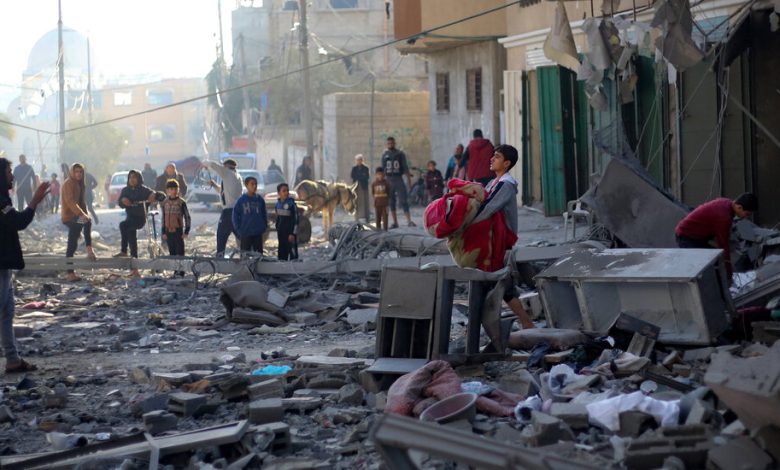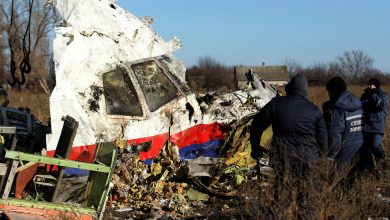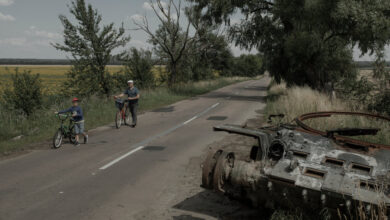Israeli Strikes Pound Gaza a Day after U.S. Vetoes Cease-Fire Resolution.

Israel unleashed a barrage of airstrikes across Gaza on Saturday, killing dozens of people and sending hundreds of wounded to overwhelmed hospitals, according to health authorities in the territory. The attacks came a day after the United States vetoed a U.N. Security Council resolution calling for an immediate cease-fire.
Some of the strikes targeted the southern Gaza Strip, where the Israeli military has ordered civilians to go to avoid bombardment, underscoring the reality that there is no safe place in Gaza to take shelter.
Videos published by Reuters from the southern city of Khan Younis showed buildings engulfed in flames after an Israeli strike. Local media reports showed videos of rescuers and civilians digging people from rubble with their hands by the light of flashlights and cellphones. Other images showed patients being treated on bloody hospital floors.
On Wednesday, the U.N. secretary-general, António Guterres, had invoked a rarely used rule that allows him to bring to the Security Council’s attention matters that “may threaten the maintenance of international peace and security.” Mr. Guterres argued that a cease-fire was necessary because of the suffering of ordinary Palestinians in Gaza and the risk that the humanitarian catastrophe there could threaten world stability.
This led to the vote in the U.N. Security Council on Friday on the resolution calling for an immediate cease-fire which the United States vetoed, saying that Israel has the right to defend itself against Hamas. Israel launched its military assault on Gaza after Hamas, the armed group which controls the enclave, led an Oct. 7 attack on Israel in which some 1,200 people were killed and 240 taken hostage, according to Israeli authorities.
Israel’s two-month aerial and ground assault on the besieged Gaza Strip has killed at least 15,000 people, and perhaps thousands more, according to the Gaza health ministry. Palestinian leaders and Arab nations say the Israeli military campaign is a profoundly disproportionate response to the Oct. 7.
America’s veto of the cease-fire resolution stunned many Gazans who had hoped the airstrikes and their suffering would stop. The day before the Security Council vote on a cease-fire, the Biden administration, Israel’s closest ally, had begun to warn that the Israeli military had not done enough to prevent harm to civilians in Gaza.
“People were optimistic that the war might end,” said Muhammad al-Masri, a local journalist in the town of Rafah in southern Gaza. “The last few days, we thought that America was going to stop this and give Israel a deadline to end the war,” he added. “But it ended up being the opposite. It is the one that opposed the cease-fire.”
Mr. al-Masri is now living in a tent encampment where the winter rains have flooded what little shelter people have. On Saturday, he said, Israel “fired two rockets near the shelter where we are staying and many people were killed and injured,” he said.
The Israeli military did not respond to requests for comment on the reports that it had targeted Rafah after urging Gaza civilians to take shelter there.
Ahmed al-Qayed, a 31-year-old carpenter, said he had pinned his hopes on the U.N. finding aresolution to the conflict so he and family could return home to Gaza City in the north of the territory.
Along with thousands of other displaced people, Mr. al-Qayed said he, his wife and their children had been living in a ramshackle tent in Rafah, where the most basic necessities, like access to a bathroom, were often not available.
“Say to America we want to go back to our homes,” he said. “What’s our guilt? We are sick and tired.”
There is a shortage of everything in Gaza, he said, including food and blankets. Like hundreds of thousands of others, they have been relying on canned food — some of it expired — and hadn’t eaten any fruits or vegetables in many weeks. He said he does not have money to buy firewood and instead spends his days trying to collect branches and twigs to keep his family warm.
Abdullah al-Nems, a 41-year old taxi driver in Rafah, said he had stopped working in part because of the lack of fuel in Gaza and in part because he was too afraid to leave his home with the frequent Israeli airstrikes.
Even at home, he said, he and his family remain afraid of bombs and missiles, which have leveled entire neighborhoods and at times killed entire families in one strike, according to Gaza residents and authorities.
“My whole life is horror,” Mr. al-Nems said. “Why should my son and daughter remain terrified all day? Why should I keep being terrified while sitting at my house?”
The war has displaced about 85 percent of Gaza’s population of more than 2 million Palestinians, with most sheltering in tent encampments, overcrowded schools and other public buildings. With the onset of winter, the situation has grown bleaker by the day, Gazans say.
U.N. officials say they are struggling to deliver essential goods like food, medicine and cooking gas to desperate civilians.
“People are talking about how the U.N. hasn’t even distributed anything that can be eaten to the people sheltering in the schools,” said Mohammed Aborjela, 27, a project coordinator with the development organization Youth Without Borders. “The United Nations can’t force Israel to do anything.”
Mr. Aborjela used to document daily life and culture in Gaza on his Instagram account before the war. Where once he uploaded videos of seaside cuisine in Gaza, now he posts about the daily struggle to find drinking water and food.
“People all had hope that the war will end within a few days,” he said. “And everyone is talking about whether it will end before the end of the year.”
Rawan Sheikh Ahmad contributed reporting.




